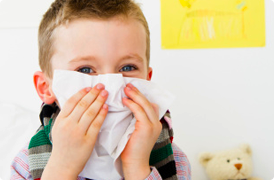Ask an Expert
What are the common sleep disorders that may affect my child?

A number of things can affect the sleep of children including nightmares and night terrors. Nightmares are common in children between the age of 3 and 6, although many will grow out of them and there will be no long lasting psychological damage. They usually occur late at night and can be very distressing and anxiety provoking for your little one. Sometimes they will be able to remember the content of the dream, other times they may not. Talking to your little one may help you to understand anything that is causing them to worry and trigger a nightmare. Some words of reassurance, and giving your child a regular bedtime routine, can help reduce the possibility of future nightmares. If you feel that there are some more serious problems underlying your little one’s nightmares, such as a stressful experience or some family matters, your family doctor will be able to discuss treatment options such as counselling with you.
Night terrors are more common in children who have a family history of sleep walking or night terrors and typically occur between the ages of 3 and 8. Witnessing a night terror in your little one can be distressing for parents as they often scream, shout and move their body around in extreme panic. They may also have their eyes open throughout, although they will not be fully awake and will rarely remember what happened in the morning. If your children are a little older, they may also jump out of bed whilst experiencing a night terror. Terrors usually occur quite early in the night and last for several minutes, although they can last for up to 15 minutes in some circumstances.
If your child does have a night terror episode it is important not to attempt to wake them as they may not recognise you and it can be upsetting for them. After their episode has finished, it is then safe to wake them up. Making sure that your child is fully awake before they go back to sleep is important – if they return quickly to a deep sleep, they may have another episode.
In the morning, your little one will not remember their night terror. It may still be a good idea to talk to your child and see if anything is worrying them that may be a trigger for each episode. If the night terrors are occurring several times a night or most nights, make an appointment with your family doctor to discuss further.
Children are much more likely to sleepwalk if either of their parents have also done so in the past or if parents have a history of night terrors. If your child does sleepwalk, the best thing to do is to guide them back towards their bed, being careful not to wake them up or startle them. There’s no specific treatment for sleepwalking, although many children will grow out of it naturally before they reach puberty. There are some importance measures that you can take to keep your little one safe if they do sleepwalk such as making sure there is nothing breakable or hazardous in the room that they could trip over. Keeping windows and doors locked is advisable and fitting stair gates at the top of your stairs will provide some extra peace of mind when it comes to keeping your little one safe from harm.
 Back to search results
Back to search results





